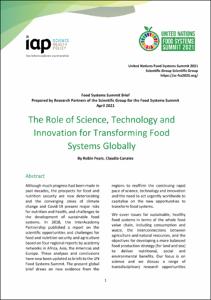The Role of Science, Technology and Innovation for Transforming Food Systems GloballyFood Systems Summit Brief Prepared by Research Partners of the Scientific Group for the Food Systems Summit April 2021

The Role of Science, Technology and Innovation for Transforming Food Systems Globally
Food Systems Summit Brief Prepared by Research Partners of the Scientific Group for the Food Systems Summit April 2021

| dc.contributor.author | Fears, Robin | |
| dc.contributor.author | Canales, Claudia | |
| dc.date.accessioned | 2021-06-08T21:44:46Z | |
| dc.date.available | 2021-05-21T14:19:09Z | |
| dc.date.available | 2021-06-08T21:44:46Z | |
| dc.date.issued | 04.2021 | |
| dc.identifier.uri | https://hdl.handle.net/20.500.11811/9105.2 | |
| dc.description.abstract | Although much progress had been made in past decades, the prospects for food and nutrition security are now deteriorating and the converging crises of climate change and Covid-19 present major risks for nutrition and health, and challenges to the development of sustainable food systems. In 2018, the InterAcademy Partnership published a report on the scientific opportunities and challenges for food and nutrition security and agriculture based on four regional reports by academy networks in Africa, Asia, the Americas and Europe. These analyses and conclusions have now been updated as briefs to the UN Food Systems Summit. The present global brief draws on new evidence from the regions to reaffirm the continuing rapid pace of science, technology and innovation and the need to act urgently worldwide to capitalise on the new opportunities to transform food systems.
We cover issues for sustainable, healthy food systems in terms of the whole food value chain, including consumption and waste, the interconnections between agriculture and natural resources, and the objectives for developing a more balanced food production strategy (for land and sea) to deliver nutritional, social and environmental benefits. Our focus is on science and we discuss a range of transdisciplinary research opportunities that can underpin the UN FSS Action Tracks, inform the introduction of game changers, and provide core resource to stimulate innovation, inform practice and guide policy decisions. Academies of science, with their strengths of scientific excellence, inclusiveness, diversity and capacity to link between national, regional and global levels, are continuing to support the scientific community in playing a key role to catalyse action. Our recommendations concentrate on priorities for building the science base – including the recognition of the importance of fundamental research – to generate diverse yet equitable solutions in providing sustainable, healthy diets, which are culturally sensitive and attend to the needs of vulnerable populations. We also urge better use of the transdisciplinary science base to advise policy making and suggest that this would be greatly advanced by constituting an international advisory Panel for Food and Nutrition Security with particular emphasis on sustainable food systems. | en |
| dc.format.extent | 20 | |
| dc.language.iso | eng | |
| dc.rights | In Copyright | |
| dc.rights.uri | http://rightsstatements.org/vocab/InC/1.0/ | |
| dc.subject | Food systems | |
| dc.subject | Agriculture | |
| dc.subject | Technology | |
| dc.subject | Innovations | |
| dc.subject.ddc | 333.7 Natürliche Ressourcen, Energie und Umwelt | |
| dc.title | The Role of Science, Technology and Innovation for Transforming Food Systems Globally | |
| dc.title.alternative | Food Systems Summit Brief Prepared by Research Partners of the Scientific Group for the Food Systems Summit April 2021 | |
| dc.type | Wissenschaftlicher Artikel | |
| dc.identifier.doi | https://doi.org/10.48565/scfss2021-q703 | |
| dc.publisher.name | Center for Development Research (ZEF) in cooperation with the Scientific Group for the UN Food System Summit 2021 | |
| dc.publisher.location | Bonn | |
| dc.rights.accessRights | openAccess | |
| dc.relation.url | https://sc-fss2021.org/wp-content/uploads/2021/06/FSS_Brief_IAP_Global.pdf | |
| ulbbn.pubtype | Zweitveröffentlichung | |
| dc.version | updatedVersion |
Dateien zu dieser Ressource
Das Dokument erscheint in:
-
FSS Briefs by Partners of Scientific Group (41)
"Food Systems Summit Briefs" are invited papers by the Scientific Group in support of the Summit agenda setting.




